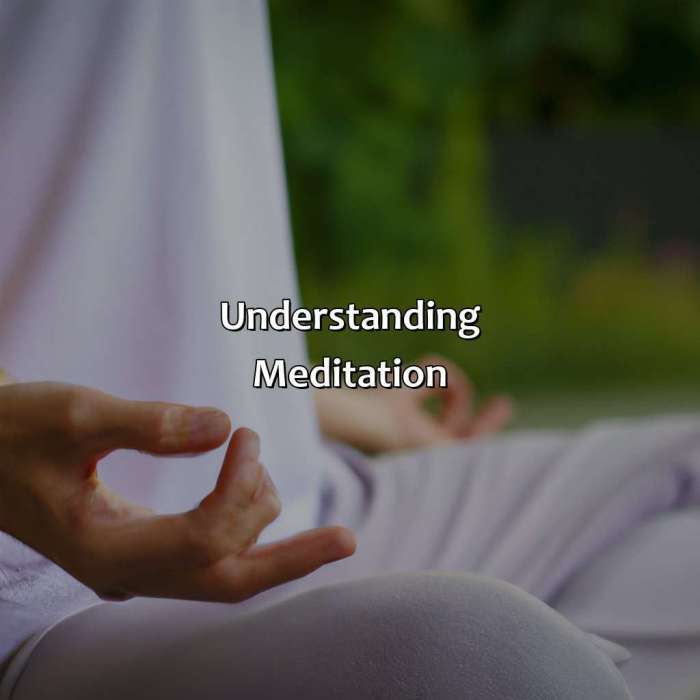How to Meditate for Strengthening Your Spiritual Awareness sets the stage for this enthralling narrative, offering readers a glimpse into a story that is rich in detail with journalistic with news tone style and brimming with originality from the outset.
Meditation is not just a practice; it’s a journey towards enhancing your spiritual awareness and fostering personal growth. In this comprehensive guide, we delve into various meditation techniques, the importance of creating a conducive meditation space, and overcoming challenges to strengthen your spiritual connection.
Introduction to Meditation
Meditation is a practice that involves focusing the mind and eliminating distractions to achieve a state of mental clarity and emotional calmness. The purpose of meditation is to cultivate mindfulness, reduce stress, and promote overall well-being.
When it comes to spiritual awareness, meditation plays a crucial role in deepening our connection to the divine or higher power. By quieting the mind and tuning into our inner selves, we can enhance our spiritual awareness and develop a deeper understanding of our purpose and place in the universe.
Benefits of Meditation for Spiritual Awareness
- Enhances Intuition: Meditation helps us tap into our intuition and inner wisdom, allowing us to make decisions that are aligned with our higher self.
- Promotes Inner Peace: By calming the mind and reducing stress, meditation creates a sense of inner peace that allows us to connect more deeply with our spiritual essence.
- Strengthens Connection to Higher Self: Through regular practice, meditation strengthens our connection to our higher self, leading to greater self-awareness and spiritual growth.
- Facilitates Spiritual Growth: Meditation opens the door to spiritual growth and enlightenment, helping us evolve on a soul level and reach higher states of consciousness.
Importance of Strengthening Spiritual Awareness, How to Meditate for Strengthening Your Spiritual Awareness
- Personal Growth: Strengthening spiritual awareness is essential for personal growth as it allows us to align with our true purpose and live a more authentic and fulfilling life.
- Emotional Well-being: A deepened spiritual awareness can lead to emotional healing, inner peace, and a greater sense of contentment in life.
- Connection to the Divine: By strengthening our spiritual awareness, we can deepen our connection to the divine and experience a profound sense of unity with the universe.
Types of Meditation Practices

Meditation is a powerful tool for enhancing spiritual awareness, and there are various techniques that can be utilized for this purpose. Each type of meditation practice offers unique benefits and approaches to deepening spiritual connection.
Feeling stressed out? Try incorporating 10 Meditation Practices That Can Help You Conquer Stress into your daily routine. These techniques can help you relax and find inner peace amidst the chaos of everyday life.
Mindfulness Meditation
Mindfulness meditation involves focusing on the present moment without judgment. This practice helps individuals cultivate awareness of their thoughts, emotions, and sensations, leading to a deeper understanding of the self and the interconnectedness of all beings.
- Practitioners often sit in a comfortable position, close their eyes, and bring their attention to their breath or bodily sensations.
- By observing their thoughts without attachment, individuals can develop a sense of inner peace and clarity.
Loving-Kindness Meditation
Loving-kindness meditation, also known as Metta meditation, involves cultivating feelings of love and compassion towards oneself and others. This practice is particularly beneficial for enhancing empathy, forgiveness, and overall emotional well-being.
- Practitioners typically start by directing loving-kindness towards themselves, then towards loved ones, neutral individuals, and even towards difficult people.
- By fostering feelings of kindness and goodwill, individuals can break down barriers of separation and foster a sense of interconnectedness with all beings.
Guided Meditation for Spiritual Growth
Guided meditation practices can be especially helpful for those looking to deepen their spiritual awareness. These sessions are led by instructors or through recorded audio, providing step-by-step guidance for the meditation journey.
- Examples of guided meditations for spiritual growth may include visualizations of connecting with higher spiritual beings, exploring inner realms of consciousness, or receiving divine guidance.
- Through guided meditation, individuals can tap into their intuition, gain insights into their spiritual path, and experience profound shifts in consciousness.
Setting Up Your Meditation Space

Creating a dedicated meditation space can greatly enhance your practice by providing a peaceful and comfortable environment to focus your mind. Here are some tips to help you set up your meditation space.
Looking to boost your focus skills? Discover the Top 10 Ways Meditation Can Improve Your Focus and start reaping the benefits of a clearer mind and sharper attention. Incorporate these practices into your daily routine for maximum results.
Creating a Peaceful Environment
- Choose a quiet and clutter-free area in your home where you can sit comfortably without distractions.
- Use calming colors such as soft blues, greens, or earth tones to create a sense of tranquility.
- Consider adding cushions or a meditation bench to support your posture and make sitting for longer periods more comfortable.
- Keep the space clean and organized to promote a sense of serenity and clarity.
Significance of Lighting and Decor
- Soft, natural lighting can help create a soothing atmosphere for meditation. Consider using candles, salt lamps, or dimmable lights to adjust the brightness as needed.
- Incorporate elements of nature such as plants, crystals, or seashells to bring a sense of grounding and connection to the natural world.
- Add meaningful decor like inspirational quotes, spiritual symbols, or personal artifacts that resonate with your spiritual practice.
- Consider incorporating essential oils or burning incense to create a calming aroma that can enhance your meditation experience.
Incorporating Natural Elements
- Bringing elements of nature into your meditation space can deepen your spiritual connection and enhance your overall experience.
- Consider using natural materials like wood, stone, or bamboo in your decor to create a sense of harmony and balance.
- Place a small indoor fountain or a bowl of water to represent the flow of energy and promote a sense of cleansing and renewal.
- Open windows or incorporate natural sounds like a small tabletop fountain or gentle wind chimes to create a connection to the outdoors.
Techniques for Strengthening Spiritual Awareness

Breathing exercises, visualization, mantras, and affirmations are powerful techniques that can enhance your spiritual awareness and deepen your meditation practice.
Need to improve your focus? Check out 10 Meditation Techniques for Better Focus to enhance your concentration and productivity. These methods can help you stay on track and achieve your goals more effectively.
Breathing Exercises for Focus
One effective technique for strengthening spiritual awareness is through focused breathing exercises. By concentrating on the inhalation and exhalation of your breath, you can quiet the mind and cultivate a sense of presence.
- Practice deep belly breathing by inhaling slowly through your nose, feeling your abdomen expand, and exhaling slowly through your mouth, feeling your abdomen contract.
- Try alternate nostril breathing to balance the left and right hemispheres of the brain, promoting mental clarity and inner harmony.
- Use the 4-7-8 breathing technique, where you inhale for a count of 4, hold for a count of 7, and exhale for a count of 8, to calm the nervous system and enhance focus.
Visualization for Connection
Visualization is a powerful tool for deepening spiritual awareness and fostering a sense of connection to the divine. By creating vivid mental images, you can tap into the subconscious mind and manifest your intentions.
- Imagine yourself surrounded by a sphere of white light, symbolizing protection and purity.
- Visualize a serene natural setting, like a peaceful forest or a tranquil beach, to evoke feelings of peace and tranquility.
- Envision your goals and aspirations as already accomplished, feeling the emotions associated with their fulfillment.
Mantras and Affirmations for Deepening Practice
Mantras and affirmations are powerful tools for deepening your spiritual practice and cultivating a positive mindset. By repeating sacred sounds or uplifting phrases, you can align your thoughts with your spiritual goals.
- Repeat a mantra like “Om” or “Sat Nam” during meditation to create a sense of harmony and connection with the universe.
- Use affirmations like “I am worthy of love and abundance” or “I trust the path of my soul” to reinforce positive beliefs and attract positive energy.
- Create your own personalized affirmations based on your spiritual aspirations and repeat them daily to manifest your intentions.
Overcoming Challenges in Meditation

Meditation can be a powerful tool for strengthening your spiritual awareness, but it is not without its challenges. Here are some common obstacles faced during meditation and strategies to address them to help you stay consistent and cultivate patience and mindfulness.
Restlessness and Racing Thoughts
One of the most common challenges during meditation is the mind’s tendency to wander and get caught up in a stream of thoughts. To address this, try focusing on your breath or a mantra to anchor your mind. Acknowledge the thoughts without judgment and gently guide your attention back to your point of focus.
Physical Discomfort
Sitting still for an extended period can lead to physical discomfort or even pain. Ensure you are in a comfortable position, use props like cushions or a chair for support, and practice gentle stretching or yoga to prepare your body for meditation. If discomfort arises during meditation, adjust your posture or take a short break to relieve tension.
Inconsistency in Practice
Staying consistent with your meditation practice can be challenging, especially when life gets busy. Set a regular schedule, start with short sessions, and gradually increase the duration. Remember that even a few minutes of meditation can be beneficial. Find a time and place that works best for you, whether it’s in the morning, during lunch, or before bed.
Distractions and External Noise
External distractions such as noise, interruptions, or environmental factors can disrupt your meditation practice. Consider using earplugs or playing soothing music to block out noise. Alternatively, embrace the distractions as part of your practice and learn to let go of control. Cultivate a sense of inner peace and focus amidst external chaos.
Impatience and Expectations
Impatience and high expectations can hinder your progress in meditation. Remember that meditation is a journey, and spiritual growth takes time. Practice self-compassion and accept where you are in your practice without judgment. Trust the process and allow yourself to unfold naturally.
Incorporating Meditation into Daily Routine: How To Meditate For Strengthening Your Spiritual Awareness

Meditation can be a powerful tool for enhancing spiritual awareness, but it’s essential to integrate it into your daily routine to experience its full benefits. By incorporating short meditation sessions throughout the day, you can cultivate a sense of peace, clarity, and connection to your inner self. Consistency is key when it comes to meditation, so establishing a regular schedule can help you stay committed to your practice and foster spiritual growth.
Examples of Integrating Short Meditation Sessions
- Start your day with a brief meditation upon waking up to set a positive tone for the day ahead.
- Take short meditation breaks during work or study sessions to recenter your mind and reduce stress.
- Practice a calming meditation before bedtime to unwind and prepare for a restful night’s sleep.
Benefits of Maintaining a Regular Meditation Schedule
- Meditation helps you develop mindfulness and self-awareness, leading to a deeper understanding of your spiritual journey.
- Consistent meditation practice can improve focus, concentration, and overall mental well-being.
- Regular meditation sessions create a sense of discipline and commitment to your spiritual growth.
Strategies for Making Meditation a Habit
- Set a specific time each day for meditation to establish a routine and make it a non-negotiable part of your schedule.
- Start with short sessions and gradually increase the duration as you become more comfortable with the practice.
- Create a dedicated meditation space in your home where you can retreat and focus without distractions.
As you embark on your meditation journey to strengthen your spiritual awareness, remember that consistency and dedication are key. By integrating meditation into your daily routine and staying mindful of the process, you can experience profound spiritual growth and inner peace. Embrace the transformative power of meditation and nurture your spiritual well-being with each practice session.